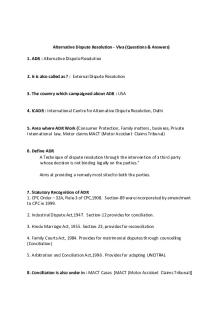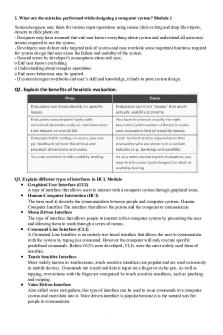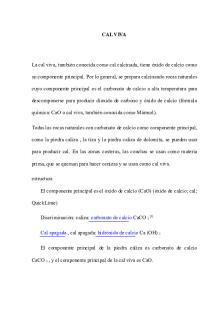ADR Viva QS - ADR VIVA PDF

| Title | ADR Viva QS - ADR VIVA |
|---|---|
| Author | Anonymous User |
| Course | LLB LAW (Honors |
| Institution | Osmania University |
| Pages | 7 |
| File Size | 73.6 KB |
| File Type | |
| Total Downloads | 66 |
| Total Views | 179 |
Summary
ADR VIVA ...
Description
Alternative Dispute Resolution - Viva (Questions & Answers) 1. ADR : Alternative Dispute Resolution
2. It is also called as ? : External Dispute Resolution
3. The country which campaigned about ADR : USA
4. ICADR : International Centre for Alternative Dispute Resolution, Delhi
5. Area where ADR Work {Consumer Protection, Family matters , business, Private International law, Motor claims MACT (Motor Accident Claims Tribunal)
6. Define ADR A Technique of dispute resolution through the intervention of a third party whose decision is not binding legally on the parties.” Aims at providing a remedy most sited to both the parties.
7. Statutory Recognition of ADR 1. CPC Order – 32A, Rule-3 of CPC,1908. Section-89 were incorporated by amendment to CPC in 1999. 2. Industrial Dispute Act,1947. Section-12 provides for conciliation. 3. Hindu Marriage Act, 1955. Section-23, provides for reconciliation 4. Family Courts Act, 1984. Provides for matrimonial disputes through councelling (Conciliation) 5. Arbitration and Conciliation Act,1996 . Provides for adopting UNCITRAL
8. Conciliation is also under in : MACT Cases [MACT (Motor Accident Claims Tribunal)]
9. Constitutional Background of ADR Free legal aid to indigent persons is provided by state Article-39-A. Right to life guaranteed under Article-21 There constitutional Rescue operation began Justice V.R.Krishna Iyer and Justice Bhagawathi ‘s report suggested for CILAS- Committee for Implementation of Legal Aid Services.
10. Modes of ADR 1. Arbitration 2. Conciliation 3. Mediation 4. Negotiation 5. Judicial Settlement through Lok Adalat 6. Pre-litigation process 7. Fast Track Arbitration or time bound For National and International Arbitration for commercial dispute. The Arbitration concludes with in a short period.(probably one or two days) 8. Lok Adalat. Legal Service Authority Act,1987 9. ODR – Online Dispute Resolution. Viable in the area of e-commerce 10. Virtual Courts . Where the accused person are prevented in the court from the police station through a video link.
11. Define Arbitration Settlement of difference or disputes by mutual understanding or agreement by parties where the rights and liabilities of the parties are adjudicated which are binding on them, such settlement made before the arbitral tribunal but not by court of Law. 12. Differences between Arbitration and Litigation In Arbitration disputes relating to matter where high technicality or expertise is concerned expert in that area can be appointed where judges are people technically. In court adjudication, contractual rights of parties are determined where are in Arbitration the arbitrator can modify the contractual rights of the parties at his direction with the consent of the parties.
13. Matter which can not be referred to Arbitration. Insolvency Proceedings Probate Proceedings Matrimonial cases except settlement of term of separation or divorce Industrial disputes Proceeding for appointment of a guardian 14. Appointment of Arbitrator : Section-11
15. No. of Arbitrators : Section – 10
16. Challenge and Removal : Section 12 to 15
17. Place of Arbitration (Venue) : Section-20 (comfortable to the parties)
18. Commencement of arbitral Proceedings : Section – 21
19. Settlement through Negotiation, Mediation, Conciliation while pending Arbitration. : Section-30
20. Form and contents of Arbitral Award : Section – 31
21. Termination of Arbitral Proceedings : Section -32
22. Application for setting aside the award. : Section -34
23. Whether appeal lies from the arbitration ? : Yes, in two can according the Section – 37 : Lack of Jurisdiction When a dispute in beyond the scope of its authority
24. Conciliation A method used by parties to a dispute to reach an amicable settlement – with the assistance of an independent third person or institution.
25. Statutory recognition of Conciliation 1. Industrial Disputes Act,1947 2. Hindu Marriage Act,1955 3. Family Courts Act,1984 4. CPC,1908 amended in 1976,1999,2002 5. Legal Service Authorities Act,1987 6. Arbitration and Conciliation Act,1996 7. MACT Claims
26. Famous case in the area of ADR “Salem Bar Association “case, where the ADR rules under CPC can be applied to supplement the cover under Family courts Act, as far as conciliation or mediation in concerned.
27. The Court Annexed Procedure of ADR was incorporated in CPC for the first time in India : In 1999, 2002
28. Which section was reinserted to CPC in 1999 and 2002? Section – 89 provided or authorise the court to try the process of ADR.
29. Salem Bar Association, Tamilnaadu Vs Union of India(2005), Significance. The Supreme Court asked the High Court to approve rules made by Justice Jaganatha Rao Committee and implement ADR measures under the Section – 89 CPC.
30. First Lok Adalat was organised I which year : In 1982, Gujaraat, in AP 1985 in Vizag
31. Cognizance of cases by Lok Adaalat : Section- 20
32. Can Criminal cases be dealt by ADR Yes, through Lok Adalats, only compoundable criminal offences, Section – 320 (1) Cr.P.C.
33. Advantage of Lok Adalat : Court Fee is returned
34. Whether award passed by Lok Adalat immuned from Article – 227 No, means can appeal lies in case of fraud, misappropriation or mistake of fact.
35. Permanent Lokadalats By Amendment Act,2002, Section-22A to 22E of Legal Service Authority Act,1987 in Public Utility Services.
36. Conciliation not bound by : CPC, Evidence Act,(under Section-66)
37. Conciliation proceedings should follow : Principles of Natural Justice
38. Principles of confidentiality : Section – 75 of 1996 Act.
39. Negotiation defined by Pepperdine University of USA “A Communication process used to put deal together or resolve conflicts. It is voluntary, nonbinding process in which the parties have control over the outcome as well as procedures by which they make an agreement. It allows for wide range of possible solutions, maximising the possibility of joint gains.
40. Negotiation Nature? : A bilateral mode of proceedings.
41. Negotiation Styles : Cooperative, competitive style
42. Negotiation is a non-binding communication : Ex. Shimla Agreement and Lahore Declaration
43. BATNA in Negotiation means : Best Alternative to Negotiated Arrangement
44. WATNA in Negotiation means : Worst Alternative to Negotiated Arrangement
45. Negotiation under Statutory Recognition 1. Hindu Marriage Act,1955 (section-23) 2. Special Marriage Act,1954 (Section-34) 3. Code of Civil Procedure ,1908( order- XXXIIA,Rule-3) 4. Family Courts Act,1984 (preamble) 5. The Legal Services Authority Act,1987 (section-19) 6. The Arbitration & Conciliation Act,1996
46. Define Mediation It is an informal process in which a trained mediator assists the parties to jointly explore and reconciliation their differences and reach a negotiated settlement.
47. Mediation Rules : Civil Mediation Rules,2003
48. Panel of Mediator Parties can agree in appointing a mediator on their own or High Court prepares a panel of Mediators, keep it on the notice board and a copy is sent to the Bar Association. District and Senior Judge make a list , after approval from the High Court put them on notice board, publish copy to District Bar Association Take the consent of the people enlisted.
49. Role of Mediator Mediator Facilitates voluntary resolution of the dispute by parties, and communicate the view of each party to the other, assist them in identifying issues, reduce misunderstandings, clarifying priorities, exploring reducing areas of compromise and generates options in an attempt to solve the dispute. He shall not impose any terms of settlement on the parties.
50. Time limit for Mediation Usually 60 days from date of first appearance till the proceedings end or terminate. If needed further 30 days in necessary cases.
51. Settlement Agreement : Mediation Settlement Agreement
52. Two models of Mediation : Interest based, The rights based Mediation
53. Mediator in : A catalyst and induces the parties
54. Styles of Mediation or approaches : Facilitative approach or Eraluative approach
55. Practical application of Mediation 1. In commercial Litigation 2. In Medical Malpractice 3. Mediation in Bankruptcy...
Similar Free PDFs

ADR Viva QS - ADR VIVA
- 7 Pages

ADR
- 10 Pages

ADR Doctrines
- 17 Pages

ADR Essay
- 2 Pages

ADR- Notes
- 156 Pages

HMI VIVA - HMI Viva Peparation
- 9 Pages

CAL VIVA - Resumen sobre cal viva
- 14 Pages

History of adr
- 4 Pages

ADR - Lecture notes 10
- 4 Pages

LLW3002 ADR Summary
- 56 Pages

ADR Exam Prep notes
- 149 Pages

ADR vs JDR - Detailed.
- 15 Pages

366099222 ADR Notes pdf
- 9 Pages

ADR - Doc - Info
- 3 Pages
Popular Institutions
- Tinajero National High School - Annex
- Politeknik Caltex Riau
- Yokohama City University
- SGT University
- University of Al-Qadisiyah
- Divine Word College of Vigan
- Techniek College Rotterdam
- Universidade de Santiago
- Universiti Teknologi MARA Cawangan Johor Kampus Pasir Gudang
- Poltekkes Kemenkes Yogyakarta
- Baguio City National High School
- Colegio san marcos
- preparatoria uno
- Centro de Bachillerato Tecnológico Industrial y de Servicios No. 107
- Dalian Maritime University
- Quang Trung Secondary School
- Colegio Tecnológico en Informática
- Corporación Regional de Educación Superior
- Grupo CEDVA
- Dar Al Uloom University
- Centro de Estudios Preuniversitarios de la Universidad Nacional de Ingeniería
- 上智大学
- Aakash International School, Nuna Majara
- San Felipe Neri Catholic School
- Kang Chiao International School - New Taipei City
- Misamis Occidental National High School
- Institución Educativa Escuela Normal Juan Ladrilleros
- Kolehiyo ng Pantukan
- Batanes State College
- Instituto Continental
- Sekolah Menengah Kejuruan Kesehatan Kaltara (Tarakan)
- Colegio de La Inmaculada Concepcion - Cebu

